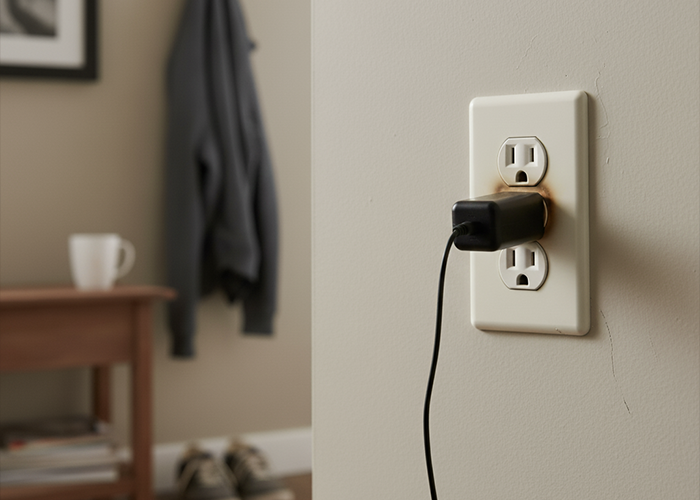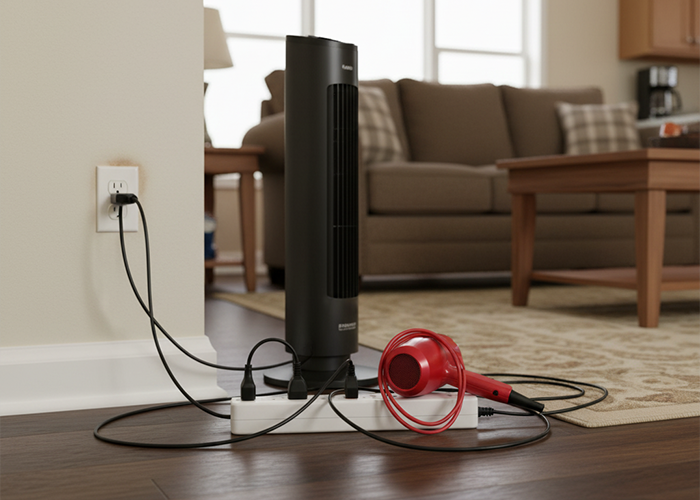Everyday life runs on electricity, so it is easy to overlook the small warning signs that something is wrong. The truth is, many home electrical hazards start quietly, then turn into serious safety issues. Understanding what to look for helps protect your family, your property, and your peace of mind.
Common Home Electrical Hazards You Might Overlook
Home electrical hazards rarely show up as dramatic sparks. Most begin with signs that feel easy to ignore. A warm outlet, a flicker in one room, or a faint burning smell can all point to deeper problems behind the walls.
Older homes, growing families, added appliances, and DIY fixes all place extra strain on existing systems. Overloaded outlets, loose wiring connections, and worn extension cords are some of the most common triggers. If these conditions are left alone, they can increase the risk of shocks, damage to electronics, or an electrical fire.
Taking these signs seriously is not about overreacting. It is about noticing patterns early and treating electricity with the same caution you already give gas lines, roofing, or structural issues.
Warning Signs Around Outlets and Switches

Start with the places you touch every day. Outlets and switches should feel neutral and look clean. Any change is a message.
If an outlet or switch feels hot, looks discolored, or smells like something is burning, that is a red flag. You might also hear a faint buzzing or crackling sound. These issues can signal loose connections, overloaded wiring, or failing devices.
Loose outlets that move when you plug something in are more than an annoyance. Movement can wear down internal parts and create gaps that lead to arcing. That arcing generates heat, and heat is what turns a small issue into a fire risk.
Clues From Your Lights and Appliances

Lights are often the first to tell you there is a problem. Frequent flickering, dimming when an appliance starts, or bulbs burning out faster than expected should not be shrugged off.
If only one fixture has trouble, the issue may be with that light or socket. When several lights in the same area flicker or dim, especially when you use a large appliance, that can point to overloaded circuits or undersized wiring. This becomes more important in homes that have added freezers, space heaters, or multiple chargers over time.
Tripping breakers are part of a safe system, but they should not trip all the time. Repeated trips on the same breaker signal that the circuit is working harder than it should or that there is a fault. Resetting the breaker again and again does not solve the cause and can hide growing home electric hazards.
Hidden Risks in Older or DIY Electrical Work
Not every risk is visible. Some are built in over time. Homes with older wiring, mixed repairs, or unpermitted work deserve closer attention.
Previous owners may have added outlets, lighting, or outdoor features without proper planning. Quick fixes, wire splices without junction boxes, or improperly grounded outlets can all create electric hazards at home. They may still “work,” but they are not working safely.
If your home still has two-prong outlets, fabric-covered wires, or panels that no one seems confident opening, it is a sign to have the system evaluated. Professional eyes can spot concerns that a homeowner or tenant will miss in a quick walkthrough.
Everyday Habits That Add To Risk

Some habits feel convenient but quietly raise the chance of trouble over time. This is where many home electrical hazards grow.
Using one outlet or power strip to handle several high-wattage appliances, such as heaters, hair tools, or kitchen gadgets, can overload a circuit. Daisy-chaining power strips or running cords under rugs or doors also increases heat and wear.
A few practical habits help lower risk:
- Plug major appliances directly into wall outlets.
- Replace damaged cords instead of taping or bending them.
- Keep electrical items away from water in kitchens, bathrooms, and outdoor areas.
These are small choices, but they create a safer baseline for the entire home.
Signs You Should Call A Professional
There are moments when waiting is not an option. Certain warning signs mean you should contact a licensed electrician or a trusted maintenance specialist promptly.
Call for help if you notice repeated breaker trips, a burning smell that you cannot trace, scorch marks, outlets that shock, or sudden loss of power in parts of the home without any clear reason. These are classic signals that something is overheating, arcing, or failing.
It is also wise to schedule an inspection after a major renovation, when buying an older property, or if you have added several large appliances over the years. A qualified professional can confirm that the system is sized correctly, identify hidden home electric hazards, and recommend upgrades before a small issue becomes an emergency.
Working With a Maintenance Specialist
A reliable maintenance specialist company can bridge the gap between what homeowners see and what technicians know. Many residents are comfortable spotting surface problems but less sure about what comes next.
Regular maintenance visits can include basic visual checks, testing outlets and breakers, confirming proper labeling on the panel, and looking for stress points in high-use areas. When something looks or feels off, a maintenance team can coordinate with licensed electricians to handle repairs safely and in line with local codes.
For communities, associations, and landlords, having a structured plan around electrical safety reduces complaints, avoids reactive panic, and creates a clear path when someone reports an issue.
Keeping Your Home Safe
Electrical problems rarely fix themselves. Paying attention to small changes, adjusting a few habits, and calling in help when needed can prevent serious damage and keep your home safer. When in doubt, treat electrical warning signs as an invitation to act, not a background noise to ignore.
Do you need expert assistance in keeping your electricals in check? Maintenance Specialists Inc. offers a wide range of commercial property maintenance services. Call us now at 704.405.6000 or contact us online for more details!
Related Articles:

